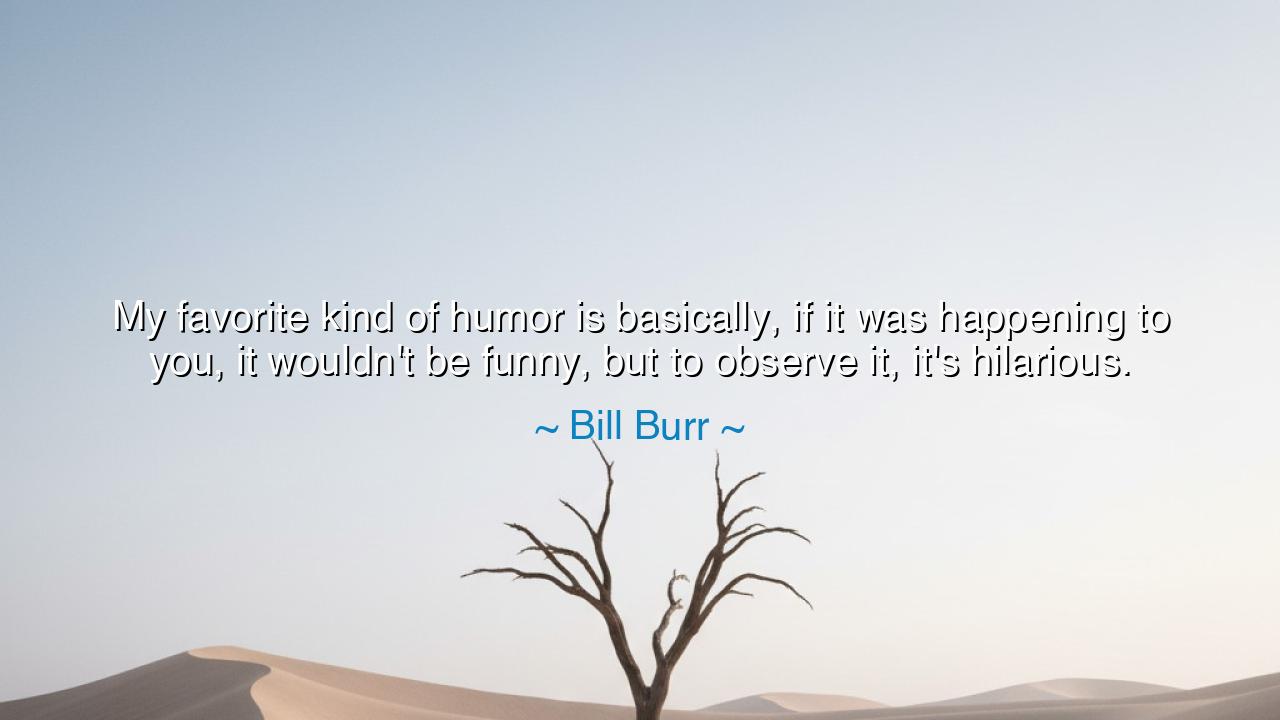
My favorite kind of humor is basically, if it was happening to
My favorite kind of humor is basically, if it was happening to you, it wouldn't be funny, but to observe it, it's hilarious.






In the words of Bill Burr, “My favorite kind of humor is basically, if it was happening to you, it wouldn’t be funny, but to observe it, it’s hilarious.” Thus speaks the jester-philosopher, the one who sees in the chaos of human struggle the divine spark of laughter. This saying, simple on its surface, conceals a wisdom older than marble and ink. It reminds us that humor is born from pain, and that the distance between tragedy and comedy is but the length of a breath — the breath between falling and laughing, between despair and release. Burr’s words echo the truth that to suffer is human, but to laugh at suffering is divine.
The ancients understood this duality well. The Greeks built their theaters with both tragedy and comedy at their heart, for they knew that one cannot exist without the other. When the people of Athens gathered beneath the open sky to watch the misfortunes of Oedipus or the follies of Aristophanes, they were not merely entertained — they were being healed. To laugh at another’s plight, or even one’s own, was not cruelty but catharsis. The laughter was a cleansing fire, burning away fear and shame. In Bill Burr’s humor, there lives this same ancient energy — a laughter that releases the spirit from the heaviness of existence.
Consider the tale of Diogenes the Cynic, who lived in a barrel and mocked the great men of his time. Once, when he was seen begging a statue for alms, a passerby laughed and asked why he did such a foolish thing. Diogenes replied, “I am practicing rejection.” The crowd laughed, not realizing the depth of his lesson: to laugh at one’s humiliation is to strip it of its power. Burr’s philosophy of humor flows from the same river. Life will mock us all — but those who can mock it back, who can stand outside their suffering for even a moment, become free.
And yet, there is something tender, even compassionate, in such laughter. It is not scorn, but recognition. When we see another stumble — spill a drink, argue foolishly, or slip on the ice — we laugh not because we hate them, but because we see ourselves in them. The absurdity of life binds us together, and humor becomes the bridge between human souls. In this way, comedy becomes empathy. What hurts in private becomes communal joy when shared, transforming isolation into connection. Thus, Burr’s words remind us that laughter, even at another’s misfortune, is the mirror through which we see the shared struggle of being human.
But there is danger, too, in this truth. To laugh only at others and never at oneself is to become cruel; to take life so seriously that you cannot laugh at all is to become lost. The wise soul walks between these extremes, knowing when to jest and when to hold silence. True humor does not humiliate — it illuminates. It reveals the folly of our pride, the fragility of our control, the eternal comedy of our plans unraveling. When Burr says “it wouldn’t be funny if it were happening to you,” he reminds us that wisdom is found in perspective. Step outside the storm, and the thunder becomes music.
Think, then, of the story of Abraham Lincoln, who carried the weight of a nation divided. Yet even in his darkest hours, he told jokes — not to escape reality, but to endure it. Once, after a political defeat, he quipped, “I feel like the man who was tarred and feathered and ridden out of town on a rail: if it weren’t for the honor of the thing, I’d rather have walked.” His humor did not erase his suffering; it transformed it. Like Burr’s laughter, it was a shield forged from honesty, pain, and grace.
So what, then, is the lesson of Burr’s words? It is that life will always humble you, and the only choice is whether to cry or to laugh. When you stumble, when the world mocks you, when the weight of your mistakes presses upon your chest — take a step back, breathe, and find the absurdity in it all. Humor does not deny pain; it reclaims it. It says, “Yes, I fell, but I am still here, and the world is ridiculous enough to keep me company.” That is strength. That is freedom.
Practical teaching: Each day, when you face something embarrassing, frustrating, or painful, pause and ask yourself, “If I were watching this happen to someone else, would I laugh?” If the answer is yes — then laugh. Allow humor to soften your heart and humble your pride. Tell your story later with a smile, not a frown. In doing so, you will transform misfortune into wisdom, shame into joy, and pain into something sacred. For those who can laugh at life’s cruelty have mastered the art of being human — and in their laughter, the gods themselves find delight.






AAdministratorAdministrator
Welcome, honored guests. Please leave a comment, we will respond soon